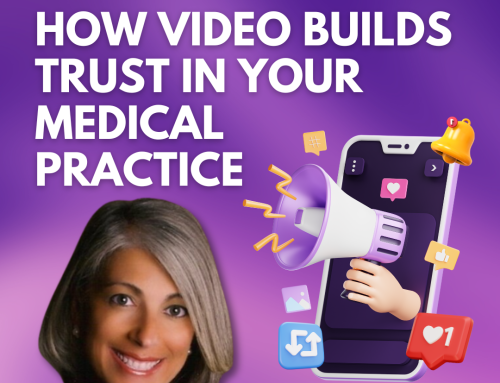Podcast: Play in new window | Download
Subscribe: RSS
In this episode, Dr. Barbara Hales and John O’Brien discuss:
● The importance of creating a positive experience for patients and staff in medical practices.
● How to handle patient reviews effectively and the role of platforms like Google and Yelp.
● Strategies for combating rudeness in healthcare environments to improve workplace culture.
Key Takeaways:
“Recognize the message that your body is sending non-verbally, and breathe. Compassion and understanding go a long way in managing rudeness and creating a better environment.” – John O’Brien
Connect with John O’Brien:
Website: Activate Success
Rudeness Resources: Rudeness Rehab
Connect with Barbara Hales:
Twitter: @DrBarbaraHales
Facebook: facebook.com/theMedicalStrategist
Business website: www.TheMedicalStrategist.com
Show website: www.MarketingTipsForDoctors.com
Email: info@TheMedicalStrategist.com
YouTube: TheMedicalStrategist
LinkedIn: www.linkedin.com/in/barbarahales
Books:
Content Copy Made Easy
14 Tactics to Triple Sales
Power to the Patient: The Medical Strategist
TRANSCRIPTION (184)
Introduction of Guest
Dr. Barbara Hales:
Welcome to another episode of marketing tips for doctors. I’m your host, Dr. Barbara Hales, and today we’re honored to have with us John O’Brien. He is a doctor, licensed psychologist, professional speaker, and executive coach in Portland, Maine, with an over 30-year career in the mental health field. He is a founder of two successful businesses and has held leadership positions in many professional organizations, including past president of the Maine Psychological Association. John serves as an adjunct professor at the University of Maine at Augusta, teaching courses in psychology, trauma, and addiction-related topics. John equips people with tangible skills and concrete tools that empower them to swiftly reduce stress levels and enhance wellness. He’s the author of the recently released book Rudeness Rehab: Reclaiming Civility in the Workplace and Your Home Space. The reason why John is a great speaker today is one of the problems of private practice for physicians: staff retention. You spend a lot of time and effort and money training staff, and then they’re unsatisfied, and they’re gone, and you have to start the process all over again. So this is something that is dear to a lot of physicians in private practice, and you’ll learn a lot of stuff today with Dr. John. Welcome to the show.
John O’Brien:
Thanks so much for having me, Dr. Hales. The first question…
What Is Incivility?
Dr. Barbara Hales:
That people might want to know is, what is incivility? Now we all may think of it as rudeness or a few four-letter descriptions, but in terms of a professional viewpoint, what is it actually?
John O’Brien:
So? As you said, people define it in various ways, but I think of it as inconsiderate or rude behavior that violates norms of appropriate workplace conduct. I would simply say, I think it’s inconsiderate behavior that causes stress in the target of the behavior, in people that witness the behavior, and even ultimately boomeranging back to the person who is rude, her or himself. I could give you some examples of what I mean by the uncivil behavior.
Examples of Incivility
Dr. Barbara Hales:
Well, unfortunately, all of us who are ultimately patients in a doctor’s office know already. Yes, it could mean that from, you know, the person at the front desk to patients who may not come with the appropriate documentation, or who are showing up on the wrong day, or who are late and therefore mucking up the schedule. Or it could be in terms of inter-staff, where the staff is just rude to each other, maybe a person feels that they have a higher status and could then boss people around, or who just happened to be extra tired, or who are just naturally rude. So these are things that we don’t want to encounter in a doctor’s office, and maybe now that it’s taken the death of the United Healthcare CEO, people might think twice.
John O’Brien:
Absolutely. Yes, about what their behavior is and the impact it’s having on others. If I may, I would just add to the comments that you made, absolutely all those things are things that are quite unfortunately common in doctor’s offices. Certainly in our office too, with patients being rude to staff, staff being rude to patients, staff being rude to each other. Staff can also be rude in electronic communication to clients or to staff. Another component is something called victimless incivility, where it’s basically people—this would be for staff—leaving a mess behind them that others have to clean up, like the photocopier being jammed, or no coffee being left in the coffee machine. Other things, just those small acts that are seemingly inconsequential, over time can build up to really create a toxic work culture.
Motivation Behind Writing the Book
Dr. Barbara Hales (05:23):
What prompted you to write a book about incivility? I know we all think about it, but, you know, people might say, how much can you actually talk about that and like, what would prompt you to write a book on it?
John O’Brien (05:55):
Well, I have worked with clients, as I said, for over 30 years individually in my office to help them combat the negative impact of other people’s behaviors. But when I heard Dr. Christine Porath speak in 2017 about her research on incivility, and really saw the alarming statistics that she communicated about the negative impact it had on the work environment, it made me think of my own dad, who had a massive heart attack when I was 15, and he was 49 and was an executive and was never able to work again. So that’s kind of the backdrop to the motivation. I’d had an awareness of stress management skills and had taught clients that for many years, but when I heard Dr. Porath speak, it really brought those two areas of expertise together. And then you add in what we all saw going on in our culture during the pandemic, and that really is what pushed me to take the time to write this book.
Victims or Perpetrators?
Dr. Barbara Hales:
This brings to mind a question, which is, do most people who are seeking help on this the victims of it? Or do people who are rude actually recognize they’re rude and want to change? Or do the rude people feel, you know what, deal with it?
John O’Brien:
Well, I would say it’s a mix. More often, people come to my office and they talk about the rudeness of other people and want help figuring out how to navigate those situations. Quite often, they are dealing with very hostile or toxic work environments. But at the same time, I do for them what my advisor in my doctoral program would do when I would describe my difficult interactions with other faculty members. She would listen as I was complaining. Then she would say, and what part of this is about your behavior? I always hated that part of it, but I encourage people to reflect on not that they are responsible for the rude behavior of others, necessarily, but how their own behavior might unwittingly be contributing to that and causing a reaction from other people.
Handling Repeat Offenders
Dr. Barbara Hales:
Do people recognize that, or do they say, well, it’s not me at all. It’s just them?
John O’Brien:
Well, sometimes people’s initial response is defensive. But if people return to my office after we have that conversation, most people say they thought about it, and it just makes sense to be mindful of their own behavior and the impact that it’s having. Certainly for your listeners, it’s easy to see the rude behavior of staff, but it’s much harder as a practice owner to step back and think about, okay, how is my behavior contributing to the problems in the practice?
What to Do with Repeat Offenders
Dr. Barbara Hales:
What is it that you do, you know, to resolve this when you have a repeat offender?
John O’Brien:
Well, it depends upon who the repeat offender is. If they’re coming to seek my help, I’ll keep working with them to try to help them change their behavior. If they are reporting to me about a repeat offender in the workplace, when we’ve had one in our work environment, the objective is to continue to call attention to their behavior, patiently but directly. We’ve never had to let someone go, but my experience is, if you keep bringing attention to their behavior and making the consequence about needing to talk about it, eventually, sometimes they self-select to leave if they’re not willing to change. If I’m consulting someone else about their workplace, it depends on whether it’s a boss, peer, or direct report. The solutions will differ based on that.
The Impact on the Practice
Dr. Barbara Hales:
How does it reflect on a doctor in his or her own practice if they do not call out this employee, but rather let them have free rein over their expression of personality?
John O’Brien:
It is very damaging. Statistics I’ve read suggest it takes one bad review to potentially take down a practice, while you need 40 positive reviews to balance it out. A toxic employee can really spoil the employee experience, and that translates into the patient experience. One person with negative or uncivil behavior can really spoil the office environment, leading to patients not wanting to return because of the staff interaction.
Reviews and Their Impact
Dr. Barbara Hales:
Correct me if I’m wrong, but I think that for someone who is mightily irked, they have more incentive to go ahead and write a review than someone who says, Well, I’m happy and like, I’ll eventually get to it.
John O’Brien:
Absolutely. Yeah, and that’s why it takes about 40 happy customers to balance out the irked people. It’s much more likely that someone will write a complaint on Google reviews than someone who’s satisfied. That’s where people go when they want to look at doctor reviews.
Best Platforms for Reviews
Dr. Barbara Hales:
Well, what a doctor needs really to, you know, have as an eye-opening fact is that when you get a review, a lot of it may have nothing to do with the doctor themselves. It has everything to do with the overall staff environment.
John O’Brien:
It absolutely does, and that’s why I think it’s so important for doctors to be clear and open with their staff, whether they’re a solo practitioner or part of a larger group. There needs to be an understanding and support for each other’s role in creating the best possible experience for the patient.
Improving Staff Interaction and Combating Rudeness in Medical Practice
Dr. Barbara Hales:
Are there exercises that you can recommend to people where they can improve the interaction between staff members and the positions?
John O’Brien:
I think of certainly reviewing material on active listening. So often we are listening to what someone is saying, but we may be thinking about how we’re going to respond already in our minds. The skills of active listening to really listen, we are not as good at listening in our culture as I think we could be. So I think certainly skills around active listening. I would also direct your listeners to the simple strategy they can find online, which is the four-step mindfulness, which is basically stop, breathe, reflect, and choose. Stopping, recognizing the stop, is recognizing when there’s a negative emotion that has caused problems for them, like anger or irritability. And we all get angry and irritable. We all do. But it’s like when you recognize that it’s overtaking you, stop, take a few breaths to sort of settle yourself. If you can reflect on what is your behavior, what are you trying to avoid, and what’s the behavior that you’d like to be doing instead? And then the choose is to try to make a healthier choice. So stop, breathe, reflect, and choose. And people can also find a little bit more information about that on my website, if they’re curious.
Dr. Barbara Hales:
What is your website?
John O’Brien:
For my coaching practice, it’s activate success.org, and if people are curious to know more about this book on rudeness, and there’s lots of videos that people can watch for free. Um, that’s at rudenessrehab.com.
Dr. Barbara Hales:
Well, that’s new, a catchy phrase that I think most of us can remember. Can you now give our listeners two tips that they could implement right away where they can combat rudeness on the part of others? It could be not only the staff, but, you know, encountering, you know, a patient who maybe is rude because they’re worried about the, you know, like time crunch, or, you know, they’re worried about their diagnosis, and that’s how they are responding. So, how do you get the doctor to, like, soften them up and get rid of that rudeness?
John O’Brien:
One of the most challenging things I have found in my own practice is to try to stay calm when people are angry at us and expressing anger because we want to, we get tense and we want to lean back. And what I advise people is instead, and I try to do myself, is to be mindful of our own physiology when someone gets really angry. Be mindful of our own physiology and try to breathe and purposefully calm ourselves, to try to stay calm ourselves. And when possible, literally, physically lean in to indicate that despite the fact someone’s angry, I’m not going away. I’m actually wanting to hear what’s going on and see if I can help you. So recognize the message that your body is sending non-verbally and breathe the power of breath. And there’s a lot of different strategies people can use around breathing. I think the other thing I would try to, I encourage people to consider, is the skill of compassion and trying to, with empathy, put yourself in that patient’s shoes. It’s hard to do when someone’s really angry, but if you can see their behavior as they’re an anxious part of them or an angry part of them or an unsettled part of them, and not personalize it, that they’re not necessarily directing it at you, but it’s about something else. And try to be mindful that people’s behavior, even though it’s directed at you, is about a whole host of other things going on in their lives.
Dr. Barbara Hales:
Well, I think that’s great advice, and I’ve really enjoyed our episode, as I’m sure most of our listeners will too. This has been another episode of Marketing Tips for Doctors with your host, Dr. Barbara Hales. Till next time



